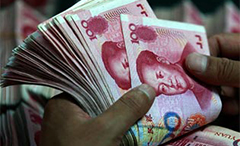China ‘fully capable’ of forestalling risks to economy, Premier Li says
2018-03-06
China Daily
China’s economic and financial risks are on the whole manageable, supported by sound economic fundamentals and sufficient policy tools, senior officials and analysts said on March 5.
“We are fully capable of forestalling systemic risks,” Premier Li Keqiang said in the Government Work Report delivered to the first session of the 13th National People’s Congress.
“What China needs to do is to tackle both symptoms and root causes and take effective measures to defuse potential risks,” he said.
The measures highlighted by the Premier include strengthening coordination in financial regulation, improving regulation of shadow banking, internet finance and financial holding companies; further improving financial regulation.
Forestalling and defusing major risks is one of the “three critical battles” to ensure high-quality economic development and fulfill the government’s key tasks this year.
A serious crackdown on activities that violate the law, such as illegal fundraising and financial fraud, will be pushed forward this year. In addition, market-oriented and lawful debt-to-equity swaps and business acquisitions and reorganizations will accelerate, according to the Government Work Report.
Local government debt risk, one of the key areas that may stimulate potential systemic risks, is fueled by nontransparent and illegal fundraising activities, and the government has pledged that these will be further controlled. Provincial-level governments “should assume overall responsibility for debts incurred by local governments within their jurisdiction”, the report said.
Huang Shouhong, director of the State Council Research Office, said on March 5 that local governments’ debt risks are under control.
No one should be under the illusion that the central government will resort to bailouts when local governments suffer debt defaults, according to Huang.
In order to secure legal financing and support key infrastructure construction projects, local governments are encouraged to issue special bonds. The government plans to issue 1.35 trillion yuan ($212.9 billion) of special bonds in 2018, an increase of 550 billion yuan from a year earlier. The scope of the use of special bonds is also pledged to expand.
Wang Yiming, vice-president of the Development Research Center of the State Council, said that further deepening of supply-side structural reform is crucial to improving the institutional environment for risk prevention.
“In-depth contradictions and problems could emerge as the economic rebalancing process goes forward, especially for dealing with the debt, which requires further opening-up and continual reform,” Wang, a member of the National Committee of the Chinese People’s Political Consultative Conference, said on March 5.
The central government has restrained the borrowing of local government financing vehicles, further contained local government debt risks, and clamped down on quasi-fiscal activity.
Standardization and development, as well as safety and innovation, should be given at least equal importance, said Ge Huayong, chairman of China UnionPay and also a CPPCC National Committee member. “We cannot afford to just highlight innovation while ignoring safety.”
“I work for the payment industry, and I think payment is a way to allow money to be transferred to an account rapidly under the prerequisite that safety is ensured. Without safety, it does not work no matter how fast the money can be transferred,” Ge said.


